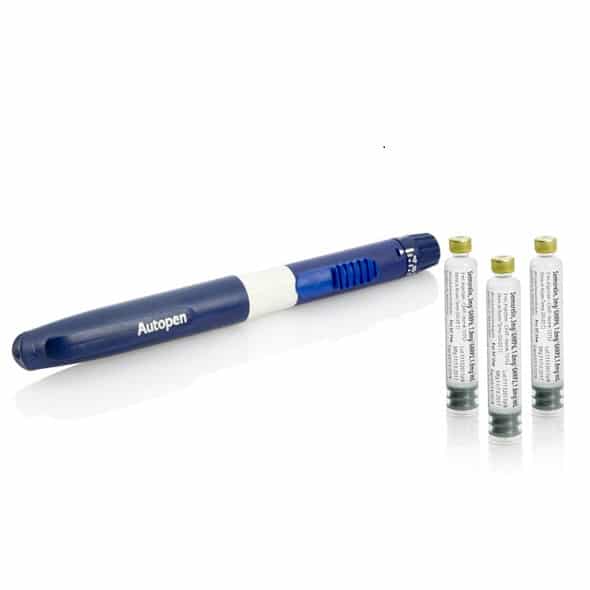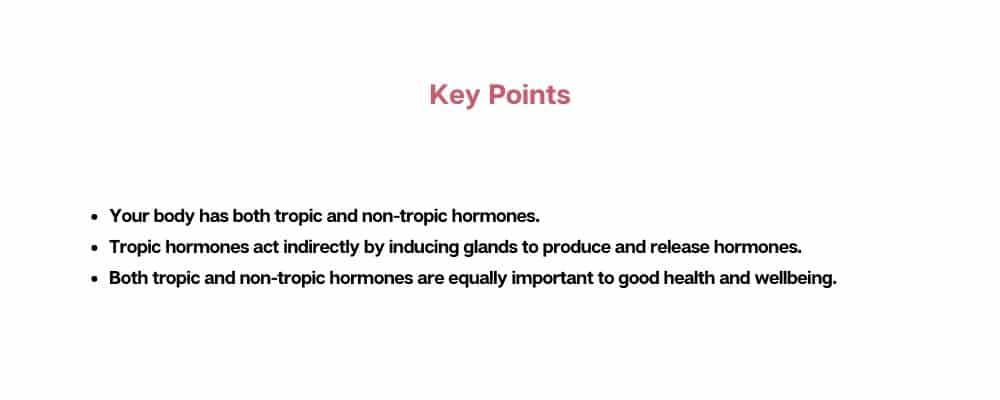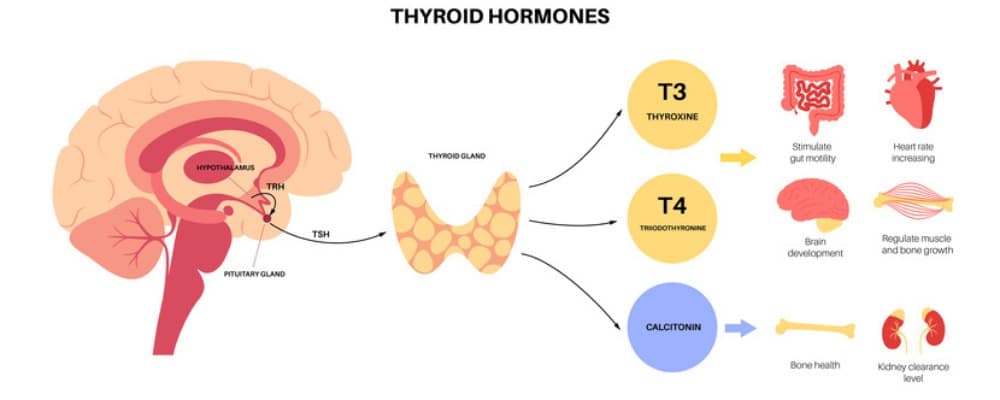
What Are Tropic Hormones & What Do They Do?
Table of Contents
Your body produces different kinds of hormones. The tropic hormones are defined as hormones that act on the glands of the endocrine system, usually inducing them to secrete other hormones. They are produced by the hypothalamus and anterior pituitary gland.
Hormones are your body’s chemical messengers. They control everything from growth to sexual function to digestion and metabolism and more. Generally speaking, hormones are divided into two categories – tropic hormones and non-tropic hormones.
Tropic hormones target other endocrine glands. The tropic hormones that are most important to maintaining hormone balance and, therefore, your overall health and wellbeing are produced and released by the anterior pituitary; they then travel through the blood seeking out the receptor sites of their target glands. The hypothalamus also secretes tropic hormones that, in turn, target the anterior pituitary itself, and the thyroid gland secretes thyroxine which in turn targets the hypothalamus, so in this way, the hypothalamus and the thyroid are also sources of vitally important tropic hormones.
Tropic hormones are often confused with the similar sounding “trophic” hormones. Though they sound alike, they are very different. Trophic hormones travel through the bloodstream and impact cells and tissues directly; they do not stimulate an endocrine gland to produce other hormones as the tropic hormones do.
Tropic hormones are very important to your health because they stimulate the release of other hormones that are vital to bodily functions, from growth to sexual reproduction. Without tropic hormones, the glands of the endocrine system could not do their jobs. Imbalances of tropic hormones can lead to some serious health issues.
Human growth hormone, or HGH, is one of your body’s most crucial hormones. As the name implies, growth hormone is what allows you to grow from a child to an adult. But even as an adult, growth hormone plays a vital role in building and repairing every cell in your body. HGH is also produced by the pituitary gland, the so-called “master gland.”
Categorizing HGH can be a little confusing, but growth hormone can be considered a tropic hormone because it has BOTH tropic and non-tropic actions. HGH can and does act on cells directly, stimulating growth and repair, making – it a trophic hormone, but it also stimulates the liver to produce and secrete other hormones, such as IGF-1, which makes it a tropic hormone.

What Are Tropic Hormones?
Chemically speaking, tropic hormones are peptide hormones, as opposed to lipid hormones or amine hormones. Peptide hormones are made from long chains of amino acids. Depending on the sequence of the amino acids within the chain will determine which peptide hormone is created. Each chain is different; each tropic hormone is different, with differing chemical structures and physical properties. Tropic hormones, like all peptide hormones, bind to specialized receptor sites on the surface of the cells of the outer walls of the target gland or organ.
What Is the Difference Between Tropic and Trophic Hormones?
Tropic hormones act indirectly by stimulating glands to release other specific hormones. Non-tropic hormones act directly upon tissues and cellular target sites. Some hormones can have both tropic and non-tropic effects.
Unlike the tropic hormone, which are intermediaries, non-tropic hormones are the hormones that act directly on the target cells to induce their desired effects. Some examples of non-tropic hormones include the following:
- Glucocorticoids
- Vasopressin (Antidiuretic hormone; ADH)
- Estrogen
- Testosterone
- Oxytocin
- Epinephrine and Norepinephrine
What Are the Different Types of Tropic Hormones?
Almost all of the tropic hormones that are crucial to your health and wellbeing are made and released by the so-called “Master Gland” – the anterior pituitary gland. In addition, the hypothalamus acts on the pituitary through the release of certain hormones, and the thyroid gland secretes thyroxine, which in turn acts on the hypothalamus, and therefore both the hypothalamus and thyroid secrete substances that fit the definition of tropic hormones.
The most important tropic hormones to your overall health and wellbeing include the following.
Thyroid-stimulating hormone (TSH or thyrotropin)
TSH stimulates the thyroid gland to make and release thyroid hormone. TSH controls the production of the thyroid hormones thyroxine and triiodothyronine by the thyroid gland by binding to receptors located on cells in the thyroid gland. Thyroxine and triiodothyronine play a vital role in metabolism, heart rate, and digestion. Thyroid hormones are also involved in muscle movement, cognition, and bone health.
Adrenocorticotropic hormone (ACTH or corticotropin)
ACTH stimulates the adrenal cortex to release glucocorticoids. ACTH controls the production of another hormone called cortisol. Cortisol is an adrenal hormone. Cortisol is known as the stress hormone. Cortisol is a testosterone antagonist., In other words, the lower your testosterone level, the higher your cortisol level, and vice versa. Cortisol is involved in the following:
- Respond to stress;
- Fight infection;
- Regulate blood sugar;
- Maintain blood pressure;
- Regulate metabolism, the process of how your body uses food and energy;
- Too much or too little cortisol can cause serious health problems.
Luteinizing hormone (LH)
LH stimulates the release of steroid hormones in the gonads—the ovary and testes. LH is a hormone critical to sexual health and reproduction. Like all of the important tropic hormones, LH is made and released by the pituitary gland, which in turn stimulates the production and release of sex hormones by the gonads as needed for sexual function and fertility.
Follicle-stimulating hormone (FSH)
FSH stimulates the maturation of eggs and the production of sperm. Like LH, Follicle-stimulating hormone is one of the gonadotrophic hormones. Also, like LH, FSH is released by the pituitary gland into the bloodstream. FSH is one of the most critical hormones to a woman’s sexual maturity, her menstrual cycles, and her ability to have children. Menstruation and pregnancy rely on FSH. FSH also plays a role in male fertility as it is also one of the hormones necessary for sperm production.
Why Are Tropic Hormones Important to Your Health?
When you look at the list of “tropic” vs. “non-tropic” hormones, it may be easy to assume that the ones that look more familiar to you on the non-tropic list, such as testosterone and estrogen, are more important than some of the ones of with the big scientific-sounding names on the “tropic list.” But, nothing could be further from the truth.
The fact of the matter is each and every one of your hormones – tropic and non-tropic – plays a vital role in your health and wellbeing. Hormones are essential for regulating most major bodily processes. In order to do that, tropic and non-tropic hormones all play an essential role in regulating almost all of your major bodily processes. They are all equally important and must work together to keep you in proper balance for optimal health – a condition often referred to as “homeostasis.”
If the level of one hormone is below normal, it can impact the levels of the others leading to hormone imbalance which can cause several health issues.
Conclusion
All of the hormones in your body work together in harmony. A hormone imbalance occurs when hormones rise above or drop below normal levels in your bloodstream. While there are certain medical conditions that occur from too much of a given hormone, too few hormones is the far more common type of hormone imbalance.
This is particularly true as we get older. As men and women age, the level of many critical hormones drop, both non-tropic hormones like testosterone and estrogen and tropic hormones such as growth hormones and thyroid hormones. The depletion of these and other hormones can cause a hormone imbalance that often results in weakness, fatigue, and a lack of energy.
Hormone imbalances are treated with hormone replacement therapy. Depending on your symptoms and diagnosis, hormone therapy can include the replacement of either tropic or non-tropic hormones. For example, testosterone and human growth hormone are often prescribed together.


